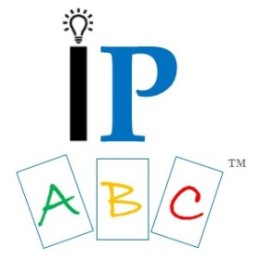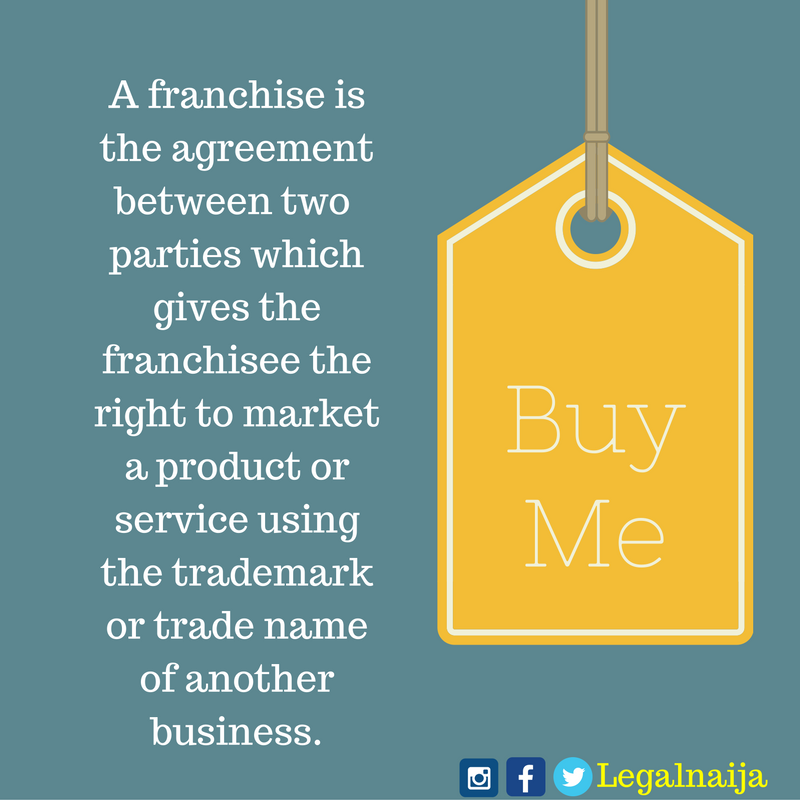Franchising is a
business model that businesses use to expand their brand and operational
footprint. A franchisor is a company, business or person that has developed a
system/name and grants a third party the right to operate a business under the
system and name in consideration of fees from the third party. According to the
International Franchise Association, a franchise is “the agreement or license between two legally independent parties which
gives: a person or group of people (franchisee) the right to market a product
or service using the trademark or trade name of another business (franchisor);
the franchisee the right to market a product or service using the trademark or
trade name of another business.’’ The essence is to enable the franchisee
enjoy commercial success in his business by ‘riding on the coat tails’ of the
franchisor. There is usually a fee (the ‘franchise fee’ or royalty) attached to
the use of the system.
There is a popular
saying that owning a franchise allows you to
go into a business for yourself, but not by yourself. The advantages of
franchising includes – access to an established product or service which
already enjoys widespread brand-name recognition, effectively giving the franchisee the benefits of a
pre-sold customer base which would ordinarily take years to establish, thereby significantly
increasing his prospect of success. It provides
franchisees with a certain level of independence where they can operate their
business, and offer consumers the attraction of a certain level of quality and
consistency mandated by the franchise agreement. The franchisee is willing to
pay for association with time tested and trusted products and methods (which
would otherwise take him years to create), through the franchise arrangement.
Some examples of
franchises in the quick service restaurant (QSR) sector in Nigeria include: Mr.
Biggs’, Domino’s Pizza, Chicken Republic, Kentucky Fried Chicken (KFC),
Debonair’s Pizza, Tastee Fried Chicken (TFC) and Tantalizers. Four of the above
examples are homegrown Nigerian brands.
STRUCTURE
AND CONSTRUCT OF A FRANCHISE AGREEMENT
A franchise
agreement (FA) by its complex and technical nature is accompanied by a bundle
of Intellectual Property (IP) rights (trademarks, service names, patent,
designs, technological know-how etc.), which are protected and regulated not
only by the FA between the parties, but also by relevant laws regulating the
transfer of such, especially where there are cross border dimensions. The IP
rights are the basis upon which the FA is built because a franchisor would be
unwilling to enter into an FA if it feels its IP rights would not be adequately
protected.
Issues can arise regarding
the impact of a franchisor’s bankruptcy or liquidation on the FA and its
resultant effect on the franchisee. What would be the fate of the IP rights vis-à-vis the franchisee’s interest? If
a liquidator is appointed over the franchisor company, the liquidator takes
control of the company and can enforce its rights against franchisees. The
franchisee must continue to pay the agreed fees and adhere to the franchise
system.
The role of the Liquidator
would be to sell the franchisor company to a third party or in the alternative
sell the assets of the franchisor which includes the IP rights. If the franchisor
company is sold to a third party (which is more preferable), then the FAs could
be assigned to the new owner and the franchisees can continue to do business as
usual. On the other hand, if the assets of the franchisor are sold, nothing
prevents the franchisee(s) from acquiring the IP Rights. It must be stated that
an FA does not terminate simply because the franchisor has gone into
liquidation. This is however subject to the express terms of the Agreement.
Franchise lawyers
spend a considerable amount of time drafting and negotiating FAs, since the FA is
the cornerstone of the franchise relationship and is likely to be in place for
a number of yearsWhile no two FAs may be identical, most include provisions such as the
grant of a trademark license, the right to operate the franchised business,
payment of fees, terms of the rights granted, limitations on how the franchisee
can use the franchisor’s trademarks, indemnity clauses, operational standards
and specifications, reporting requirements, default, termination,
post-termination obligations, non-compete clauses and disclosure of
confidential information, and procedures for dispute resolution.
However, these
clauses are subject to judicial interpretation. In Canada, the court recently
held that a ‘non-compete’ clause in an FA may not be enforceable in all
circumstances against the franchisee. A non-compete clause is a clause which
estops a party from engaging in a business similar in nature to that which the
particular agreement is centred upon. In an FA, these clauses are used to
ensure that the franchisee does not, with the know-how obtained from the
franchisor during the course of the relationship, operate a business which
would be in unfair competition with the franchisor and other subsequent
franchisees. However, a recent Canadian decision seem to suggest that the fact
that there is a non-compete clause in a franchise agreement, does not make it
enforceable. The Ontario Court of Appeal, in MEDIchair LP v DME Medequip Inc, 2016 ONCA 168, refused to enforce
a franchisee’s non-compete covenant because the evidence demonstrated that the
franchisor did not intend to open a franchised store within the restricted
territory.
The Court concluded
that non-compete covenants must protect “the legitimate interest of the
franchisor”, but cannot extend beyond that. In this case, the franchisee had
de-identified its franchise and opened a similar business in the same location;
however, because the franchisor did not intend to operate in the protected
territory after the franchise relationship ended, the franchisor was found not
to have the requisite legitimate interest to restrict competition by the
franchisee within that territory. However, where a franchisee is declared to be
in breach of these provisions, the franchisor can take out injunctions in order
to protect its position. In the Nigerian
case of Andreas Koumoulis v. Leventis
Motors Limited, (1973) ALL NLR 789, the appellant was sued for breach of
his contract of service as spare parts Sales Manager. Clause 6 of the contract
provided that the appellant shall not for at least a year, after leaving the
employment of the respondent, operate a similar business as that of the
respondent within a 50 miles radius from any trading station owned by the
respondent. The Supreme Court affirmed the decision of the trial court and held
that the clause was enforceable against the appellant.
Finally, as with
any business relationship, there is a dispute resolution component to franchise
arrangements. Franchise litigation lawyers typically deal with claims such as
violations of franchise sales laws or franchise relationships laws,
misrepresentations during the franchise sales process, failure to pay amounts
due, failure to make required refunds, and failure to provide contracted support.
Franchisors typically try to control litigation somewhat with contractual
provisions that require the franchisee to submit certain claims to mediation or
arbitration or require the franchisee to litigate only in a specific forum. In
2013, an Australian franchise, Pie Face,
was on the wrong end of series of legal action from its franchisees for
misleading representation about potential sales and profitability. In order to
avoid litigation, it is essential that the franchisor and the franchisee
clearly lay out the duties and obligations of both parties, warranties (if any)
and expected timelines for the performance of the said duties.
LEGAL
FRAMEWORK FOR FRANCHISING IN NIGERIA
Till date, there is
no specific franchising legislation in Nigeria. However, it must be stated that
there are several regulatory provisions, existing in bits and pieces that affect
franchising in Nigeria. An example is the National
Office for Technology Acquisition and Promotion (NOTAP) Act Cap. N62 LFN 2004
which established NOTAP. It would however be erroneous to state that NOTAP Act
is the regulatory Act for franchising in Nigeria. This is because NOTAP deals
only with the transfer of technology from foreign entities. Arguably, if an FA
was to be executed between local entities there would be no need for NOTAP registration.
However, there are still some legal issues to be sorted such as trademark
registration, incorporation of entities etc. For example, a company considering
franchising may wish to form a new entity to offer franchises and must decide
what type of entity to form, how to organize it, and what organizational
documents are necessary. Due to the fact that franchisees buying into a system
will want the unrestricted right to use the name and mark used by the system, a
franchise lawyer will work with the franchisor to obtain registration of the
trademarks. Section 4(d) and (e) NOTAP
Act grants NOTAP the power to register franchise agreements involving foreign
franchisors. The section goes further to state that the agreement shall be
registrable if in the opinion of NOTAP, it involves the use of trademarks, the
right to use patented inventions, the supply of technical expertise in the form
of the preparation of plans, diagrams, operating manuals or any other form of
technical assistance of any description whatsoever, the provision of operating
staff or managerial assistance and the training of personnel etc.
By virtue of Section 7 of the NOTAP Act:
‘…no payment shall be made in Nigeria to
the credit of any person outside Nigeria by or on authority of the Federal
Ministry of Finance, the Central Bank of Nigeria or any licensed bank in
Nigeria in respect of any payments due under a contract or agreement mentioned
in section 4(d) of this Act, unless a certificate of registration issued under
this Act is presented by the party or parties concerned together with a copy of
the contract or agreement certified by the National Office in that behalf.’
Regulation
4 of the Income Tax (Transfer Pricing) Regulation 1, 2012, states
that where a connected taxable person has entered into a transaction or a
series of transactions to which the Regulation applies, the person shall ensure
that the taxable profits resulting from such controlled transactions are in a
manner consistent with the arm’s length principle otherwise the FIRS shall make
necessary adjustments. Arm’s length principle simply means that the conditions of a
controlled transaction should not differ from the conditions that would have
applied between independent persons in comparable transactions carried out
under comparable circumstances. The arm’s length principle is relatable to
franchising in that it seeks to guide the relationship between connected parties
(companies that share common control or participate directly or indirectly in the
management, control or profit of one another). For example, agreements between
Group and Holding companies, subsidiaries, companies with the same directors
etc. However, this provision would arise in the event of future collaborations/transactions
(JVs, Technical Services Agreement etc.) between the franchisor and the
franchisee as a means of preventing unfair advantage in the dealings of related
entities. There are other provisions of the NOTAP Act which deals with
franchising such as section 6 providing
for the basic requirements which must be included in the service agreement
(including FAs) for it to be approved by NOTAP.
The basic
problem with NOTAP regulating FAs between local and foreign entities is its
lack of transactional focus. Some of the provisions in the NOTAP Act are too
bureaucratic in nature without paying particular demands to the tenets and
dynamics of the franchise Industry. Unfortunately, the same lack of
transactional mindset is exhibited by many Nigerian regulatory agencies, whose
consequent poor performance weighs businesses down, and negatively impacts
competitiveness of Nigerian businesses.
INTERNATIONAL PERSPECTIVES
Other
jurisdictions have already begun to enact and amend their laws in order to maximise
the advantage of franchising. In the United States, some provisions of the California Franchise Relations Act (CFRA)
were revised through the California Bill AB-525 which was passed into law in 2015.
This sweeping new law gives franchisees across California more protections when
purchasing, transferring and terminating their FAs. Sponsored by the Coalition
of Franchisee Associations (CFA), the law affects new franchisees (i.e., those
who are granted or renew an agreement after January 1, 2016) and current
franchisees upon sale, transfer or termination of their FA. Specifically, the
law amends the CFRA to generally make FAs, more franchise friendly. The changes
made were more significant in the sale, transfer and termination of FAs. For
instance, the law changed the 30 day notice and cure period required before a
franchisor can terminate an FA to a 60 day notice and cure period.
The
franchise industry within the United States is showing no signs of slowing
down. Franchising and distribution continue to make up a large part of the
United States’ economy. According to The
Franchise Times of 2014, the top 200 franchise systems on its rankings had
total annual sales in 2013 of $590 billion.
In South
Africa (like Nigeria), there is also no singular law regulating franchising.
However, franchising is adequately provided for in South Africa’s Consumer Protection Act 2008, which defines
franchising and its various concepts. It also covers provisions on certain
consumer rights which afford protection to potential franchisees, chief among which
are:
(a)The
right to obtain a disclosure document when assessing a franchise opportunity fourteen
days before signing the franchise agreement. The disclosure document should
contain the number of franchise outlets, list of current franchisees,
franchisor’s turnover and net profits etc.; (b) the right to cancel the
agreement with no penalty within 10 business days of signing it (cooling off
period); and (c) Protection against unfair discrimination by suppliers; and (d)
protection against a franchisor receiving a direct or indirect benefit or compensation
from suppliers to its franchisees or its franchise system unless the fact
thereof is disclosed in writing with an explanation of how it will be applied.
CONCLUSION
In order
for Nigeria to fully leverage franchising as a tool for economic development,
it would be necessary to enact laws to guide franchise transactions. Franchising,
as a form of strategic alliance holds a lot of promise for economic development
by building up entrepreneurial capacity of local business people, indigenising
the economy, and contributing to halt capital flight; hence, it should receive
institutional support. FAs are more often than not, one-sided in favour of the
franchisor and as such, most franchisees would require protection through specific
laws. General contract law cannot fully embrace the challenges therein. An
example can be drawn from the Landlord-Tenant relationship. Before the passing
of the Tenancy Law of Lagos State 2011, it was the norm for Landlords to
collect multiple years rent in advance. Section 4 of the Law put a stop to this
oppressive act (although it is yet to be seen whether compliance has been as a
result of the positive impact of the law or due to the commercial
impracticability which has made such practice financially disadvantageous).
Nigeria should take a leaf in franchise regulation from United States and South
Africa. The Disclosure Document and ‘cooling off’ period that are required in
South Africa are additional points aiding the cause for franchise regulation in
Nigeria. This would be particularly important where the franchisor is a foreign
company; the franchisee needs to be adequately protected in a fair and balanced
FA. Proper franchise regulation would go a long way in unleashing the
entrepreneurial energy of Nigerians and also in creating an atmosphere which while
inviting investment is also conducive for growth.
Franklin
Okeke, Esq. is a commercial lawyer focusing
on franchise arrangements and practices with Messrs LeLaw Barristers & Solicitors, Lagos



